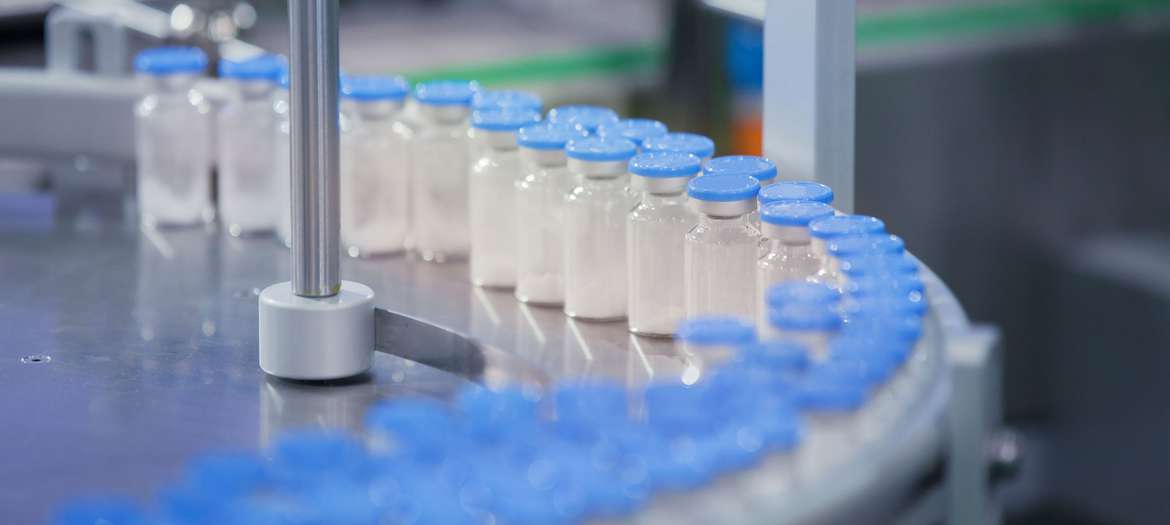Situation
Poor lubricating properties of the steam condensate lead to oxidation
HSMR double seal for foam breakers of a pharmaceutical company

Poor lubricating properties of the steam condensate lead to oxidation
Increase the service life of the seals, prevent contamination of the biocultures
Double seal HSMR with DiamondFace from EagleBurgmann

More than 100 agitators at the Belgian site of a multinational pharmaceutical company are equipped with mechanical seals from EagleBurgmann. The seals are installed in vessels with capacities of either 100 or 800 liters that the pharmaceutical company uses to produce biocultures for the production of vaccines.
The vessels are equipped with an agitator with bottom entry and a foam breaker with top entry. The foam breaker eliminates the foam that is generated by the bacteriological process on top of the liquid product in the vessel. Due to the increasingly stringent guidelines of the US Food and Drug Administration (FDA) for the production of vaccines, the pharmaceutical company decided to use the double seal HSMR from EagleBurgmann to seal the shafts of the foam breakers. At speeds of 1,500 revolutions per minute, these seals reliably prevent the product from entering the atmosphere via the shaft passage or outside microorganisms from entering the product. They are therefore an important component in ensuring sterile vaccine production.

Of great importance for biotechnical processes is the hygienic design of the seals. The HSMR double seals meet this high requirement with a smooth, dead space-free surface contour. In addition, the seals withstand temperatures of up to 121 °C (249.8 °F) during sterilization for periods of 20 to 60 minutes, since production is subject to the requirements of certified cleaning in place (CIP) and sterilization in place (SIP) processes.
SPU circulation pumps from EagleBurgmann supply buffer fluid to the mechanical seals. Only steam condensate, i.e. high-purity water, is permitted as a barrier medium for the production of the biocultures. Due to the low electrical conductivity, however, the steam condensate has poor lubricating properties. The sliding faces of the seal are therefore designed in hard/hard pairing and highly precise hydrodynamic grooves ensure better distribution of the steam condensate.
It was nevertheless unavoidable that the low electrical conductivity of the barrier fluid would lead to oxidation of the silicon carbide and thus to the destruction of the sliding faces. The challenge for EagleBurgmann now was to optimize the seal face and the seat made of the FDA-compliant material silicon carbide on the product side. A special silicon quality was found which prevents oxidation and silicon carbide particles from contaminating the biocultures. The materials for the O-rings and the seal were also optimized.

The result was not yet one hundred percent satisfactory. Therefore, the sealing specialist resorted to a technology that had been already developed in 2007 together with the Fraunhofer Institute for Coating and Surface Technology: Each seal face and seat was replaced by a version with a DiamondFace coating that protects against wear caused by dispersed solids in the product and partial dry running of the seal. This technology involves applying a microcrystalline diamond layer of up to 15 μm to the seal faces under vacuum and at temperatures of 2,000 °C (3,632 °F) by chemical vapor deposition (CVD). This extremely hard, thermally conductive and chemically robust coating gave EagleBurgmann control over the consequences of the low electrical conductivity of the steam condensate.
After all of these improvements, the service life of the mechanical seals at the foam breakers increased significantly.
At the Belgian site, the pharmaceutical company benefits above all from the technical support and documentation diligence of EagleBurgmann. This includes the analysis of system failures, repairs and the replacement of seals. EagleBurgmann maintains a workshop in Belgium exclusively for customers in the pharmaceutical industry and was audited by the customer with the Belgian production site. In accordance with quality standards, all service and repair steps are reliably documented at a high level.
Interested in learning more about our wide range of products & services for the pharmaceutical industry?
EagleBurgmann provides extensive support in the field of sealing technolgogy. Read more.
HSMR double seal for foam breakers of a pharmaceutical company
Mechanical seals for agitators, mixers, dryers, kneaders and other special machines. The true all-rounders when it comes to aggressive, sticky or viscous media or when solids content is high.

In Great Britain, a shortage in natural gas supply has severe consequences: Since the country switched from coal-fired to gas-fired power stations, a gas supply shortage makes households and industrial consumers not only vulnerable to failing heating and gas stoves, but also to power outages. Companies along the value and transportation chain of natural gas are therefore especially dependent on reliable equipment.

A boiler circulation pump in a power plant conveys very hot and pressurized water. The pump has no cooling jacket, which increases the risk of a thermosiphon effect.

By means of custom-made PLUG & RUN expansion joints with a more wear-resistant material, EagleBurgmann was able to provide a solution which ideally fulfills the requirements with regard to wear while at the same time significantly reducing the changeover time.

Mechanical seals are not always the best choice. In roller dryers used in the production of pharmaceutical powder, abrupt shaft deflections during processing led to increased seal wear. Operation was maintenance-intensive and prone to faults.

Special expansion joints from EagleBurgmann compensate for these position changes and work reliably even under unfavorable conditions such as low temperatures, proximity to the sea and explosive environments.

The Etzel oil and gas cavern system is situated southwest of Wilhelmshaven, not far from the North Sea coast. A vast salt dome houses the more than 70 caverns which store crude oil and natural gas at depths between 900 and 1,700 meters. Etzel is integrated in the northwest European oil and gas pipeline network and makes a significant contribution to the safe and reliable supply of gas to Germany and all of Europe.
